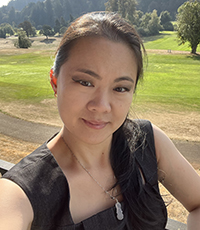Pediatric Gastroenterology Fellowship
Message from the Program Director

Welcome to the Pediatric Gastroenterology Fellowship at Oregon Health & Science University (OHSU)/Doernbecher Children’s Hospital in Portland. We are excited that you are considering us for your fellowship.
We are pleased to announce the start of our newly accredited fellowship program this July 2024. We have a very motivated team of gastroenterologists, nurse practitioners, nutritionists, psychologists, and social workers eager to impart their wisdom and experience to you. The OHSU Pediatric Gastroenterology Fellowship program is structured to provide comprehensive training where graduates will leave with the knowledge and skills to have successful careers. We embrace the unique interests of each fellow and will tailor your research and clinical electives accordingly. Not only are we located in the beautiful Pacific Northwest, but we are also the only pediatric gastroenterology fellowship in the state. We see patients coming from the entire Oregon state, Southern Washington, and Northern California. Thus, fellows will have a broad exposure to gastrointestinal diseases on the inpatient service and outpatient clinics. We strive to ensure a healthy work-life balance that allows fellows to explore and enjoy life outside the hospital, better enabling them to care for the patients within OHSU.
We look forward to the opportunity to get to know you and welcome any questions you many have about how our program may fit you.
Best wishes,
Gillian Lam, MD, FAAP
- Train outstanding pediatric gastroenterologists who can provide excellent quality patient care.
- Educate fellows within a multidisciplinary and interdisciplinary environment drawing from a diverse patient population.
- Graduate fellows with a lifelong commitment to learning with the goal of continuous practice improvement.
- Contribute to the education and scholarship that may help advance our knowledge of pediatric gastroenterology.
- Provide a rigorous training and scholarly experience, while promoting a healthy work-life balance that values personal satisfaction and happiness.
Benefits for Pediatric Gastroenterology fellows include:
- Membership to the North American Society For Pediatric Gastroenterology, Hepatology & Nutrition (NASPGHAN)
- Attendance to NASPGHAN’s annual Pediatric Gastroenterology Fellows Conference
- Support for attendance to an additional regional or national conference if accepted to present
- Unlimited access to the Division of Gastroenterology’s textbook library
Please see the Department of Pediatrics fellowship page for departmental benefits available to all pediatric fellows, and the OHSU GME page for Employment and Benefits information, including salary, transportation, and insurance.
Clinical training
During the first year, fellows spend the majority of their time on the inpatient and consult service. Fellows will manage care for primary patients on the Pediatric Gastroenterology service and help provide consultations to patients on other services, as well as in the NICU and PICU. Other clinical rotations include ambulatory clinic, procedures, psychology, nutrition, radiology, and pathology. Most clinical training takes place in Doernbecher Children’s Hospital. To expand fellows’ views of different practices, they will also travel to several of OHSU’s outreach sites in Oregon, including Salem, Springfield, and Medford.
In the second and third years, fellows have protected time set aside to complete a scholarly project with the goal of achieving publication readiness. Fellows are encouraged to apply for training grants to help support scholarly pursuits, though the receipt of a grant is not a requirement. Although clinical commitments during the second and third years of training are significantly decreased, additional inpatient and outpatient opportunities are available to those trainees who would like to pursue a more clinically focused career.
Starting in the first year of training and continuing through all three years of fellowship, fellows are assigned a half-day of continuity clinic. Patients seen in this clinic will be primary patients of the fellow, allowing for longitudinal care and the opportunity for fellows to manage their own panel of patients. Referrals come from a wide catchment area that spans the entire state of Oregon, Southern Washington, and Northern California, which will give fellows clinical exposure to a wide variety of diseases within pediatric gastroenterology.
Fellows will have dedicated training time for procedures throughout all three years of fellowship. Gastroenterology procedures performed at Doernbecher Children’s Hospital include, but are not limited to, upper endoscopy, colonoscopy, polypectomy, sclerotherapy and banding, dilation, GJ tube placement, liver biopsy, paracentesis, foreign body removal, manometry, and botox injections. In addition, there are opportunities for fellows to gain additional endoscopic experiences through collaboration with adult gastroenterology, including therapeutic endoscopy.
All fellows will participate in the overnight and weekend home call pool. On-call fellows may be required to return to the hospital at night for emergent patient situations.
Didactics
Throughout the three years of fellowship training, fellows participate in a wide range of educational activities to further their learning. These include:
- Fellows' Education Series – fellow-led conferences (weekly)
- Peds GI Division Education Conferences, including journal club (twice monthly)
- OHSU-wide IBD case conferences and educational series
- Joint Pediatric Gastroenterology/Pediatric Surgery Conference (quarterly)
Fellows are also highly encouraged to participate in the educational offerings of the Department of Pediatrics, including:
- Pediatric Grand Rounds (weekly)
- Friday Forum (weekly)
- All-Fellows’ conference series (monthly)
Scholarship and mentorship
Several of our faculty are involved in our Pediatric Gastroenterology and Hepatology Research Program. Fellows will meet with the program director and faculty to delineate research interests within the first year of fellowship. This is followed by the choice of a research mentor and project, with scholarly activities to commence by the second year of fellowship, when fellows will be provided with substantial protected time toward completing their research project.
Fellows may choose from several areas for their research project including but not limited to:
- Clinical
- Basic science
- Translational
- Education
- Advocacy/health policy
As part of their subspecialty training, all Department of Pediatrics fellows are required to participate in the OHSU Human Investigations Program (HIP), which strives to provide an educational foundation for successful, comprehensively trained researchers based upon the competencies of clinical and translational research. The cost of the HIP Certificate in Human Investigations is covered by the department, and fellows have the option to pursue a Master’s Degree of Clinical Research.
Scholarly Oversight Committee
Each fellow provides regularly scheduled progress meetings to their respective Scholarly Oversight Committee (SOC). The SOC is composed of the primary research mentor, the program director, and three research-related experts, including one member from outside the gastroenterology division. Fellows may select the panel of experts and are often assisted by the primary research mentor. It is the goal of the SOC to provide useful guidance, critique, and direction for the successful completion of the fellow’s scholarly project.
Teaching opportunities
We believe that everyone is always learning and striving to improve. We teach our fellows how to be teachers based on the Adult Learning Theory. Fellows are involved in teaching learners in numerous settings. Being part of an academic medical center, fellows teach medical students, residents, and other clinical trainees during inpatient rounds and outpatient clinic sessions. Fellows will also help lead small-group teaching sessions designed to supplement the clinical experience for medical students and residents rotating on our service. Fellows will also provide formal didactics during departmental and divisional education conferences.
How to apply
Applications to the OHSU Pediatric Gastroenterology Fellowship must be submitted through the Electronic Residency Application Service (ERAS) and include the following:
- MyERAS application
- Personal statement – Please describe your specific interest in OHSU and Portland; this can be included as a brief addendum to the end of your personal statement.
- Medical school transcript
- Medical Student Performance Evaluation (MSPE)
- Letters of recommendation (minimum 3)
- USMLE or COMLEX scores
- ECFMG certificate (if applicable)
Please also see the OHSU GME information on Applying to OHSU Residencies and Fellowships.
Oregon Health and Science University values a diverse and culturally competent workforce. We are proud of our commitment to being an equal opportunity, affirmative action organization that does not discriminate against applicants on the basis of any protected class status, including disability status and protected veteran status. Individuals with diverse backgrounds and those who promote diversity and a culture of inclusion are encouraged to apply. To request reasonable accommodation contact the Office of Civil Rights Investigations and Compliance at 503-494-5148 orocic@ohsu.edu.
Interview day
All interviews will be conducted virtually in October and early November to allow equitable access for all applicants. The day will include a general overview of our program and hospital, as well as 30-minute interviews with up to four of our clinical and research faculty.
Contact us
Gillian Lam, MD, FAAP
Fellowship Program Director
lamg@ohsu.edu
Kristina Fancy, C-TAGME
Fellowship Program Coordinator
fancyk@ohsu.edu
